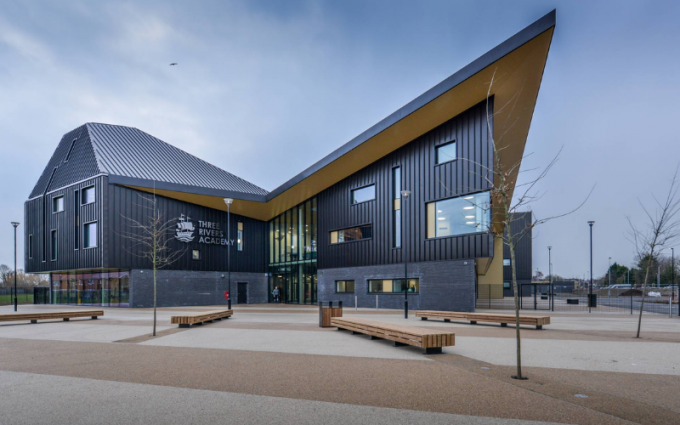'Relationships are the foundation of everything that Thrive does'
Thrive is primarily known as an approach used in schools, but it can also be implemented effectively in other settings such as hospitals, children’s centres and youth groups. Here, Martin Downs, Deputy Head of Education at Feltham Young Offenders Institution explains why he felt Thrive was the right fit for the institution and the impact it has had so far.
Q) Why did you introduce the Thrive Approach to Feltham YOI?
A) I have always worked in mainstream education, either in Alternative Provisions (AP) or Special Educational Needs settings which have used Thrive. I felt that what would work in an AP would work in a Youth Offenders Institute (YOI) as they use the same types of structured roles and routines. I wanted to try Thrive because the learners coming in here often, but not always, have limited experience of school. They are school refusers or they are disengaged with education and, underlying that, is the fact that their basic needs have not been met. For the vast majority of our learners that’s about their developmental needs. They are rarely here because of a single event in their lives, their journey to a YOI begins a long time before they become involved in crime. =
Q) How did you go about adapting the Approach so that it would work at Feltham?
A) I felt that the science behind Thrive would work here. I did have some questions in terms of our cohort of learners. They are a long way along their journey and they are at an age where a lot of their behaviour is ingrained and they are at the extreme end of the scale - the vast majority of the boys have been sentenced, or are on remand for, murder or rape, those types of offences.
We don’t have the static population of learners that you have in mainstream education - boys come and go quite rapidly here. They can move on to different establishments for a variety of reasons and it’s rare that we have a cohort of learners with us for any length of time. I asked Sharon Gray (Thrive trainer and member of the Youth Justice Board) if she thought we could implement Thrive successfully here and her answer was that she was sure we could.
Q) What has the implementation of Thrive looked like at Feltham?
A) I did my Adolescent Licensed Practitioner training in 2022. We decided to introduce Thrive as a pilot with a small group of boys. We started with six boys, but three of them moved on to other establishments, so we completed the pilot with the remaining. We used Thrive-Online (TOL) as a diagnostic tool to find out where they were emotionally and socially. Generally, we receive good information from the various stakeholders involved about the boys, but sometimes it can be difficult to get information so having TOL to give an accurate picture of where they were was really helpful. This data was then circulated to all staff so that everyone knew the full picture.
Our goals here are focused on attainment and also on developing softer skills around things like communication and self-awareness. Part of our curriculum is that all of the boys have one-to-one mentoring sessions and we used these sessions for our Thrive work. We have a trauma-informed, attachment-aware curriculum and we also use things like music therapy so Thrive was something that sat well with the other strands of activity that we have here.
Q) What was the biggest challenge you faced and how did you overcome it?
A) We needed to adapt the activities suggested by TOL so that they were relevant and appropriate for the boys here. We found that a lot of them weren’t suitable for us but, when we discussed the options as a team, based on the knowledge we had about each boy and their background and interests, we were able to find activities that worked for them. We found that as long as we put this initial thought into the process, it was something that worked well. We are now working with Thrive to incorporate appropriate more activities for young offenders into TOL.
Q) What has the impact of Thrive been so far?
A) It has helped us to create a more in depth profile of the boys. It’s a very powerful tool for generating individual profiles that can then be shared with all staff. We found that Thrive worked very well for us as part of our one-to-one mentoring sessions because we were just talking to the boys with no agenda and no issues to address and this helped us to build really good relationships with them. With the small group we have worked with we can definitely see that are we developing their confidence and their ability to manage. We have seen an improvement in our metrics and can say that Thrive, in addition to some of the other things we do here, has resulted in an improvement to the boys’ mental health and wellbeing. All of the boys felt that their skills had improved during the period they were working with Thrive Licensed Practitioners and the feedback from staff was also that there had been an overall improvement – you can even see it in the way that they carry themselves around the department.
As most educators know from Maslow's hierarchy of needs, to achieve educational outcomes like attainment and progress to GCSEs or vocational or functional skills, you need to make sure that the softer skills are developed so that young people feel safe. These basic needs have to be met or there can be no progress. Thrive is a great way of ensuring that this solid foundation is in place as well as helping to build relationships with staff. If you can have a relationship with a learner, especially a hard-to-reach learner, then it’s far more likely that they will be able to progress to attainment.
Relationships are the foundation of everything that Thrive does. It also provides very rich data that helps the team to understand what is going on for that learner. Everyone here knows that the behaviour that the boys sometimes display on the outside doesn’t always match what is going on inside. Thrive is a diagnostic tool that shows us where the behaviour is coming from.
Q) After the pilot scheme, what is the next stage on Feltham YOI’s journey with Thrive?
A) I would like to see Thrive rolled out into a bigger pilot for all of the boys to be screened. I think it would be beneficial to roll out the mentoring aspect to groups to see how that works for us. That will be a big step because when the boys are in small groups there is a lot of bravado but the walls come down if they are working on a one-to-one basis and they are happy to talk about their feelings. This would be something we’d need to consider carefully because boys here are always grouped on the basis of risk. For example, if they have had interactions through gangs then they can’t be in a group together so you end up with boys from different backgrounds who are at different stages so it can be hard to find the commonality.
Over to you
Click here to schedule a Discovery Call with your regional expert to find out how Thrive could be adapted to help young people in your setting. Designed to fit in around your schedule, these free 30-minute conversations via Teams give you a chance to have your questions answered and decide if our service is a fit for your needs.

_680.jpg)
_680.png)
(1)_680.jpg)

